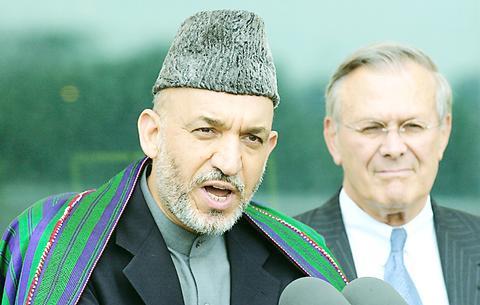Afghan President Hamid Karzai yesterday called on NATO to provide more peacekeeping forces for his country ahead of planned September elections, but said he was not seeking additional US troops.
Karzai and US Secretary of Defense Donald Rumsfeld, in an outdoor news conference at the spot where a hijacked plane slammed into the Pentagon on Sept. 11, 2001, also expressed confidence that Osama bin Laden, whose al-Qaeda network was blamed for the attack, will be captured, but did not guess when.
Karzai was scheduled to meet yesterday with US President George W. Bush.

PHOTO: REUTERS
After a meeting with Rumsfeld, who has visited Afghanistan six times, Karzai said he did not make a "specific request" for the US to add to the roughly 20,000 troops it currently has in Afghanistan.
"The United States is already busy in Afghanistan helping us in reconstruction, and helping us fight terrorism and helping us secure our borders," Karzai said.
But he said he expected NATO "to fulfill the promise that we have been made. We are hoping that NATO will come to Afghanistan especially before the elections of September."
NATO took charge of the International Security Assistance Force troops last year. The alliance leads roughly 6,000 peacekeepers concentrated in the capital Kabul and a small civilian-military team in the northern city of Kunduz.
But NATO has struggled to expand its peacekeeping operation into unruly provinces because of the reluctance of allies to commit costly military equipment such as helicopters and planes. Many NATO allies argue that their militaries are overstretched by operations around the globe, including in Iraq and the Balkans.
Karzai, picked to serve as president by a traditional Afghan council, is seeking election as president in the elections originally planned for June but now scheduled for September.
The US has doubled its troops in the country this year amid an intensified effort to track down al-Qaeda and Taliban fugitives, including bin Laden. US-led forces in 2001 toppled the Taliban regime, which had harbored al-Qaeda.
"All nations, yours and ours, have had fugitives in our histories. And has a fugitive run forever? No, at least not in my country," said Karzai, referring to bin Laden. "So he's a fugitive right now. He's hiding somewhere. And he's on the run. And we're after him. We'll catch him one day, sooner or later."
US officials have said they believe bin Laden is hiding in the rugged Afghan-Pakistani border areas.
Karzai also emphasized his commitment against the growing of poppies in Afghanistan, the world's top opium-producing country, but called for "strong, consistent international support." He did not elaborate or fault any specific country's efforts.
"The fight against poppies is the fight for Afghanistan. And no matter who or how, we will not allow this to continue. Poppies criminalize the Afghan economy. Poppies prevent the institution-building in Afghanistan. Poppies go hand-in-hand with terrorism," Karzai said.

A fire caused by a burst gas pipe yesterday spread to several homes and sent a fireball soaring into the sky outside Malaysia’s largest city, injuring more than 100 people. The towering inferno near a gas station in Putra Heights outside Kuala Lumpur was visible for kilometers and lasted for several hours. It happened during a public holiday as Muslims, who are the majority in Malaysia, celebrate the second day of Eid al-Fitr. National oil company Petronas said the fire started at one of its gas pipelines at 8:10am and the affected pipeline was later isolated. Disaster management officials said shutting the

US Vice President J.D. Vance on Friday accused Denmark of not having done enough to protect Greenland, when he visited the strategically placed and resource-rich Danish territory coveted by US President Donald Trump. Vance made his comment during a trip to the Pituffik Space Base in northwestern Greenland, a visit viewed by Copenhagen and Nuuk as a provocation. “Our message to Denmark is very simple: You have not done a good job by the people of Greenland,” Vance told a news conference. “You have under-invested in the people of Greenland, and you have under-invested in the security architecture of this

Japan unveiled a plan on Thursday to evacuate around 120,000 residents and tourists from its southern islets near Taiwan within six days in the event of an “emergency”. The plan was put together as “the security situation surrounding our nation grows severe” and with an “emergency” in mind, the government’s crisis management office said. Exactly what that emergency might be was left unspecified in the plan but it envisages the evacuation of around 120,000 people in five Japanese islets close to Taiwan. China claims Taiwan as part of its territory and has stepped up military pressure in recent years, including

UNREST: The authorities in Turkey arrested 13 Turkish journalists in five days, deported a BBC correspondent and on Thursday arrested a reporter from Sweden Waving flags and chanting slogans, many hundreds of thousands of anti-government demonstrators on Saturday rallied in Istanbul, Turkey, in defence of democracy after the arrest of Istanbul Mayor Ekrem Imamoglu which sparked Turkey’s worst street unrest in more than a decade. Under a cloudless blue sky, vast crowds gathered in Maltepe on the Asian side of Turkey’s biggest city on the eve of the Eid al-Fitr celebration which started yesterday, marking the end of Ramadan. Ozgur Ozel, chairman of the main opposition Republican People’s Party (CHP), which organized the rally, said there were 2.2 million people in the crowd, but